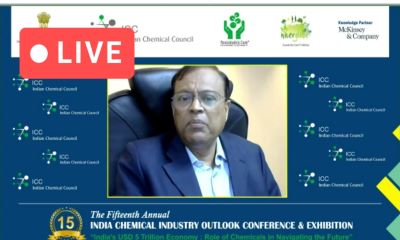Partnerships, technology advancement, and plug & play models a must for expansion of downstream industry

The main option that can give us feedstock is the integration of refining with the petrochemicals industry, says B. Ashok, Chief Executive Officer, Ratnagiri Refinery and Petrochemicals Ltd (RRPCL).
Ashok spoke at the session on ‘Emerging Trends, Disruptions and Opportunities in the New Normal Session’ on the sidelines of the 15th Annual India Chemical Industry Outlook Conference and Exhibition. The event was themed “India’s USD 5 Trillion Economy: Role of Chemicals in Navigating the Future” and organized by Indian Chemical Council (ICC).
It is only of late that the concept of petrochemicals and value added chemicals produced by the refineries have taken shape but looking at the supply demand ratio, there is a huge gap in terms of availability of feedstock so we need a world scale cracker every year, says Ashok.
Ashok is bullish on the integration and partnerships. He says, "In addition to the transitional phase, the demand for fuels is going to remain in India, though it will go down eventually. Bio based feedstocks are there but in a nascent stage. We need to invest the Capex for technology development through risk sharing. We are going towards 10-15% integration of petrochemicals with refining.
“New projects have 20-30% integration. There is a buzz about it globally but remains at 12%. Saudi Aramco and Reliance are talking about it. There is a need for a lot of technological development for conversion. Downstream capex is also getting focused on refinery integration.
“Yet for a 15 million tonnes project, we need huge capex. For a 30 million tonnes project, we need Rs. 4 lakh crore. One of the ways is partnership based projects. A proper plug and play infrastructure is required for the expansion of downstream industry."
"The other aspect is the under-penetration of the basic thermochemistry industry, consumption of chemicals and petrochemicals is mere 10 kg as compared to the world average of 30 kg globally. We are not even talking about the advanced countries’ average which is probably above 100 kg. But to even reach the world average of 30 kg, we need to produce 30 times more than what we are producing now," mentions Ashok.
Sharing his thoughts on possible opportunities and challenges, Ashok said, "I am optimistic that our economy will grow above 8% in the years to come, and other than facing any Covid-19 like uncertainties, we should be doing well. We have a huge market and that is the reason for the interest by several international players wanting to be a part of the domestic industry. Having said that, there is a huge gap in terms of availability of petrochemicals for the domestic industry. It remains a challenge, whether Propylene or Ethylene, the basic raw materials. 2.6 million tonnes is the shortfall which is expected globally. Methylene, Styrene. We are in deficit and it is going to increase further. In the case of Polyethylene, a lot of additional capacities are getting set up but the gap between demand and supply is only increasing. Be in PVC for piping or other areas, everywhere there is a huge deficit that is only growing further."
Ashok lists out a few solutions: "What can we do about it? The main option that can give us feedstock is the integration of refining with the petrochemical industry. That has seen remarkable progress in the last few years. If you see every standalone refinery today of major organizations such as Indian Oil, HPCL, BPCL or whether private sector such as Reliance already has a huge presence and so has Hindustan Mittal Energy Limited (HMEL). All are focusing on integration and value added chemicals. It is also important in terms of risk mitigation strategy for refiners as everybody anticipates that going forward there is going to be lower demand for fuels. So what can we do with the stocks that we are producing? The best is to convert these into value added products, including petrochemicals."
"There is also a need for a robust ecosystem for downstream players. The PCPIRs are witnessing limited progress due to a lot of issues, including local land acquisition, feedstock and and otherwise. We need a swift implementation. The policies have to be understood and implemented at the local level with the involvement of state governments. The gap between policy framed in New Delhi and state governments have to be matched," adds Ashok.
Subscribe to our newsletter & stay updated.